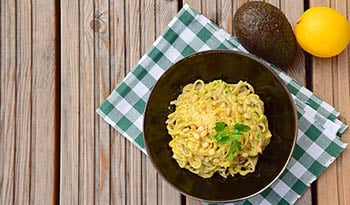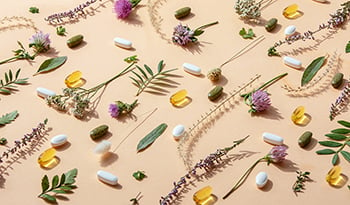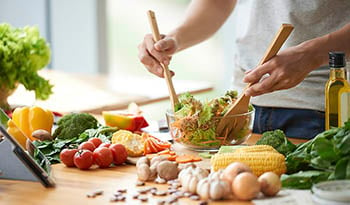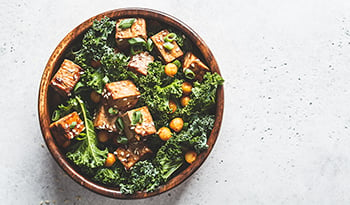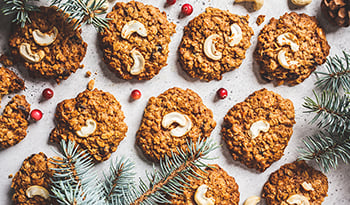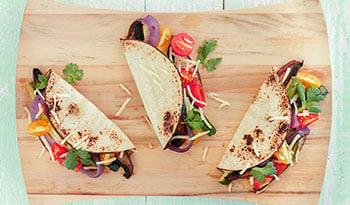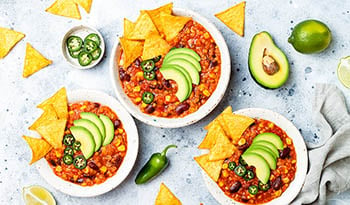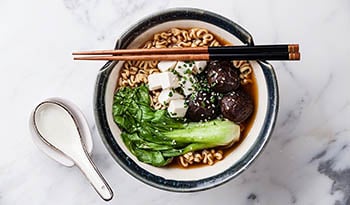Follow a Vegan Diet? Consider These 11 Supplements and Superfoods

You have decided to adopt a vegan diet, or maybe you've just started to consider it. With the plethora of health benefits, if you do decide to follow a vegan diet, you surely won’t regret it.
You should know a few things when starting a vegan diet, as an informed decision often translates into the best decision. This article will help you decide if a vegan diet remains right for you, and it will provide information on the benefits of changing to a vegan diet as well as some tips for starting out.
What Is a Plant-Based Diet?
A variety of diets fall under the plant-based diet umbrella. When starting a plant-based diet, you should first decide which of these titles most befit you:
- Vegetarian: Vegetarians do not eat meat. Depending on the type of vegetarian, you may consume eggs or dairy.
- Ovo Vegetarian: No to meat and dairy, yes to eggs.
- Lacto Vegetarian: No to meat and eggs, yes to dairy.
- Lacto-Ovo Vegetarian: No to meat, yes to eggs and dairy.
- Vegan: You do not eat any animal products, including meat, dairy, and eggs.
- Raw Vegan: You eat a vegan diet with the added restriction of no processed or cooked foods.
- Pescatarian: You eat vegan meals with the addition of seafood.
- Flexitarian: Your diet is flexible, eating primarily vegan foods with occasional meat consumption.
Health Benefits of a Vegan Diet
Studies show various health measurements can be balanced by eating vegan. These measurements include:
- Blood Pressure
- Cholesterol Levels
- Hemoglobin A1c
- Body Mass Index (BMI)
If you are trying to get your numbers down or want to significantly lower the chance that they elevate over time, a vegan diet is highly recommended. If numbers do not concern you, but you'd like to be more conscious of your body weight, a vegan diet may also help support healthy weight loss.
Your doctor may have suggested a vegan diet if you show early signs of diabetes or prediabetes since this approach can help to protect your body from developing diabetes, heart disease, and other chronic illnesses.
Yet another benefit to eliminating animal products from your diet results in the decreased number of medications required to manage chronic illness. A vegan diet helps avoid reactionary inflammation in the body, a major contributor to chronic disease development.
Tools for Transitioning to a Vegan Diet
Sure, you could simply start eating lots of salads, but the few same options could get old fast. There are tons of easy ways to get creative with your vegan meal planning. Consider a few items that can help you make vegan more fun and pleasing to the palate.
- Food Processor — This is a must-have for great vegan dishes. For example, try vegan tacos made with walnuts and sundried tomatoes blended in a food processor. Don't forget the tomatillo salsa to go on top, which you can also make in a food processor with tomatillos, garlic, cilantro, onion, and lime juice.
- Blender Bottle — Staples of the vegan diet include protein shakes and smoothies. These handy bottles come with a mini wire whisk ball inside to help mix thick and powdery ingredients into silky, great-tasting nutritional drinks.
- Cutting Board — You will be chopping lots of fruits and veggies with a vegan diet. A good cutting board and a proper knife will go a long way.
- Steamer Basket — Used to steam fresh vegetables, a steamer basket becomes ideal for keeping food out of boiling water, helping to maintain crispness and nutrient content.
- A good vegan cookbook, or two!
11 Vegan Diet Staples to Support Nutrition and Health
Nutritional Supplements for a Vegan Diet
Since meat has been eliminated from your diet, certain supplements can help bridge the gap for various nutrients that may be more difficult to consume in sufficient amounts. The following products can help ensure that you get the right amount of nutrients needed each day.
- Protein Powder — Without animal protein, it could be difficult to get sufficient protein each day. A protein powder can help increase your protein intake while substituting a meal for a smoothie or shake. Protein powders come in many varieties and flavors. You will want to select a vegan protein to ensure you do not mistakenly ingest animal products in your shake.
- Vitamin B12 — Studies show vegans and vegetarians at most risk for vitamin B12 deficiency as the foods highest in B12 include meat, fish, milk, cheese, and eggs — all foods to be avoided in the vegan diet. Not to worry, a B12 supplement will help prevent deficiency. B12 proves essential for many body functions including proper nervous system function, DNA production, protein metabolism, and red blood cell formation.
- Iron — Two types of iron exist: heme, found in animal products, and non-heme, found in plants. Heme iron, more easily absorbed, could lead to iron deficiency if you follow a vegan diet. An iron supplement may be needed to prevent iron deficiency anemia in vegans and vegetarians.
- Zinc — Important for immune function and proper cell function, zinc does not comprise very many plant foods. Studies show that blood levels for zinc remain lower for vegetarians and vegans compared with omnivores. A multivitamin with zinc or a zinc supplement may be needed if you follow a vegan diet.
- Calcium — While plenty of plant sources provide dietary calcium, studies show that many people who follow a vegan diet do not get sufficient amounts of calcium. Other studies show vegans may have an increased risk of bone fractures due to inadequate calcium intake. Taking a calcium supplement may help you maintain strong bones, a properly functioning heart and muscles, and healthy teeth.
- Vitamin D — Not only vegan dieters have problems getting enough vitamin D. The list of foods that contain vitamin D falls short for everyone, meaning getting enough from your diet remains difficult for us all. Vitamin D, critical for proper immune function and optimal mental health status, also helps your body to absorb calcium — vital if you follow a vegan diet. Vitamin D supplements offer an ideal option for most people. Visit your doctor to get your vitamin D levels checked before taking high doses of this fat-soluble vitamin.
- Omega-3 Fatty Acids — Research shows that vegetarians and vegans have significantly lower levels of docosahexaenoic acid (DHA) and eicosapentaenoic acid (EPA), both made from Alpha-linolenic acid (ALA), which only comes from the foods you eat. DHA and EPA primarily come from animal products such as fish oil, salmon, and mackerel. ALA, EPA, and DHA are Omega-3 fatty acids vital to eye and brain health. Other benefits of Omega-3s include decreased risk for an array of chronic illnesses. Not to fret, a vegan oil can supplement Omega-3 fatty acids. Algae oil can support Omega-3 levels in vegans and vegetarians.
Superfoods for a Vegan Diet
Supplements offer a great way to get in all the nutrients that could be missing by eliminating animal products. Many foods can be added to the vegan diet to help bridge the gap as well.
Check out these superfoods to stock up on if you have decided to live a vegan life.
- Chia seeds — High in Omega-3 fatty acids, chia seeds deliver lots of nutrients with minimal calories. Full of antioxidants, fiber, and protein, these tiny seeds pack a powerful punch.
- Flax seeds — Similar to chia seeds, flax seeds are high in Omega-3s and protein needed with a vegan diet. They also may balance your blood pressure and cholesterol.
- Nutritional Yeast — A B12 fortified food, nutritional yeast can help reduce your risk of vitamin B12 deficiency once you begin a vegan lifestyle. It has other added benefits including a healthy supply of vitamins, trace minerals, protein, and antioxidants. Nutritional yeast, a complete protein, has all nine essential amino acids we must get from food sources.
- Pumpkin Seeds — A vegan source for iron, pumpkin seeds offer a tasty snack packed with health benefits. With vegans and vegetarians having a difficult time getting sufficient iron, pumpkin seeds represent a great way to boost this essential mineral. Other foods high in iron include beans, nuts and seeds, cruciferous vegetables, and dried fruit.
Should You Begin a Vegan Diet?
From weight loss to lower blood pressure, the health benefits of a vegan diet remain hard to match. Touting the potential to decrease cholesterol, hemoglobin A1c, and the risk of a future diagnosis of chronic illness, studies suggest physicians recommend a vegan diet to all their patients — especially those suffering from hypertension, heart disease, obesity, and other chronic illnesses.
A vegan diet does come with some potential nutrient deficiencies. Iron, B12, Omega-3s, vitamin D, zinc, calcium, and protein signify potential nutrients that would need to be supplemented or at least monitored when eating a vegan diet.
Overall, it seems the benefits far outweigh the risks, but only you and your doctor can decide if this proven nutritional strategy is right for your optimal health and wellness.
References:
- Tuso PJ, Ismail MH, Ha BP, Bartolotto C. Nutritional update for physicians: vegan diets. Perm J. 2013;17(2):61-66. doi:10.7812/TPP/12-085.
- Lanou AJ, Svenson B. Reduced cancer risk in vegetarians: an analysis of recent reports. Cancer Manag Res. 2010;3:1-8. Published 2010 Dec 20. doi:10.2147/CMR.S6910.
- Watzl B. Anti-inflammatory effects of vegan foods and of their constituents. Int J Vitam Nutr Res. 2008 Dec;78(6):293-8. doi: 10.1024/0300-9831.78.6.293. PMID: 19685439.
- Pawlak R, Parrott SJ, Raj S, Cullum-Dugan D, Lucus D. How prevalent is vitamin B(12) deficiency among vegetarians?. Nutr Rev. 2013;71(2):110-117. doi:10.1111/nure.12001.
- Reynolds E. Vitamin B12, folic acid, and the nervous system. Lancet Neurol. 2006 Nov;5(11):949-60. doi: 10.1016/S1474-4422(06)70598-1. PMID: 17052662.
- Foster M, Chu A, Petocz P, Samman S. Effect of vegetarian diets on zinc status: a systematic review and meta-analysis of studies in humans. J Sci Food Agric. 2013;93(10):2362-2371. doi:10.1002/jsfa.6179.
- Clarys P, Deliens T, Huybrechts I, et al. Comparison of nutritional quality of the vegan, vegetarian, semi-vegetarian, pesco-vegetarian and omnivorous diet. Nutrients. 2014;6(3):1318-1332. Published 2014 Mar 24. doi:10.3390/nu6031318
- Saunders AV, Davis BC, Garg ML. Omega-3 polyunsaturated fatty acids and vegetarian diets. Med J Aust. 2013;199(S4):S22-S26. doi:10.5694/mja11.11507
- Bloch MH, Qawasmi A. Omega-3 fatty acid supplementation for the treatment of children with attention-deficit/hyperactivity disorder symptomatology: systematic review and meta-analysis. J Am Acad Child Adolesc Psychiatry. 2011;50(10):991-1000. doi:10.1016/j.jaac.2011.06.008
- Guesnet P, Alessandri JM. Docosahexaenoic acid (DHA) and the developing central nervous system (CNS) - Implications for dietary recommendations. Biochimie. 2011;93(1):7-12. doi:10.1016/j.biochi.2010.05.005.
- Li K, Huang T, Zheng J, Wu K, Li D. Effect of marine-derived n-3 polyunsaturated fatty acids on C-reactive protein, interleukin 6 and tumor necrosis factor α: a meta-analysis. PLoS One. 2014;9(2):e88103. Published 2014 Feb 5. doi:10.1371/journal.pone.0088103
- Martins JG. EPA but not DHA appears to be responsible for the efficacy of omega-3 long chain polyunsaturated fatty acid supplementation in depression: evidence from a meta-analysis of randomized controlled trials. J Am Coll Nutr. 2009;28(5):525-542. doi:10.1080/07315724.2009.10719785
- Zheng JS, Hu XJ, Zhao YM, Yang J, Li D. Intake of fish and marine n-3 polyunsaturated fatty acids and risk of breast cancer: meta-analysis of data from 21 independent prospective cohort studies. BMJ. 2013;346:f3706. Published 2013 Jun 27. doi:10.1136/bmj.f3706
- Lowcock EC, Cotterchio M, Boucher BA. Consumption of flaxseed, a rich source of lignans, is associated with reduced breast cancer risk. Cancer Causes Control. 2013;24(4):813-816. doi:10.1007/s10552-013-0155-7
- Saxena S, Katare C. Evaluation of flaxseed formulation as a potential therapeutic agent in mitigation of dyslipidemia. Biomed J. 2014;37(6):386-390. doi:10.4103/2319-4170.126447
- Caligiuri SP, Edel AL, Aliani M, Pierce GN. Flaxseed for hypertension: implications for blood pressure regulation. Curr Hypertens Rep. 2014;16(12):499. doi:10.1007/s11906-014-0499-8
- Donaldson MS. Metabolic vitamin B12 status on a mostly raw vegan diet with follow-up using tablets, nutritional yeast, or probiotic supplements. Ann Nutr Metab. 2000;44(5-6):229-234. doi:10.1159/000046689
DISCLAIMER:This Wellness Hub does not intend to provide diagnosis...
















































































 Table of Contents
Table of Contents



